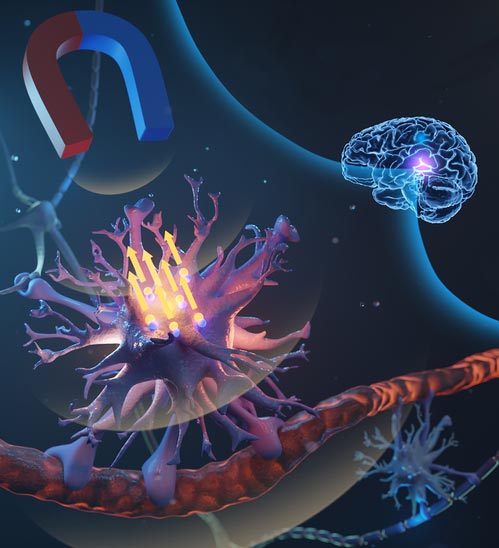Touch sensitive brain cells controlled by micromagnets

Graphic illustration of magnetomechanical stimulation
Credit: Yichao Yu and Mark Lythgoe at UCL
Scientists at UCL have developed a new technique that uses microscopic magnetic particles to remotely activate brain cells; researchers say the discovery in rats could potentially lead to the development of a new class of non-invasive therapies for neurological disorders.
Published in Advanced Science, the pioneering technique called “magnetomechanical stimulation” or , allows touch sensitive brain glial cells called astrocytes to be stimulated with a magnetic device outside the body.
Microscopic magnetic particles, or micromagnets, are attached to astrocytes, and used as miniature mechanical switches that can turn “on” the cells when a strong magnet is placed near the head.
Co-author, Professor Alexander Gourine (UCL Centre for Cardiovascular and Metabolic Neuroscience) said: “Astrocytes are star-shaped cells found throughout the brain. They are strategically positioned between the brain blood vessels and nerve cells. These cells provide neurons with essential metabolic and structural support, modulate neuronal circuit activity and may also function as versatile surveyors of brain milieu, tuned to sense conditions of potential metabolic insufficiency.
“The ability to control brain astrocytes using a magnetic field gives the researchers a new tool to study the function of these cells in health and disease that may be important for future development of novel and effective treatments for some common neurological disorders, such as epilepsy and stroke.”
Senior author, Professor Mark Lythgoe (UCL Centre for Advanced Biomedical Imaging) said: “Because astrocytes are sensitive to touch, decorating them with magnetic particles means you can give the cells a tiny prod from outside the body using a magnet, and as such, control their function. This ability to remotely control astrocytes provides a new tool for understanding their function and may have the potential to treat brain disorders.”
In developing MMS, scientists at UCL set out to create a more clinically relevant brain cell control technique. This contrasts with other existing research tools, such as optogenetics and chemogenetics, which require foreign genes to be inserted into the brain cells, typically with the help of a virus. This need for genetic modification has been a major obstacle to the clinical translation of the existing methods.
Lead researcher Dr Yichao Yu (UCL Centre for Advanced Biomedical Imaging) said: “Our new technology uses magnetic particles and magnets to remotely and precisely control brain cell activity and, importantly, does this without introducing any device or foreign gene into the brain.
“In the laboratory-based study, we coated microscopic magnetic particles with an antibody that enables them to bind specifically to astrocytes. The particles were then delivered to the target brain region in the rat via injection.
“Another advantage of using micromagnets is that they light up on an MRI scan so we can track their location and target very particular parts of the brain to get precise control of brain function.”
Professor Lythgoe, who received the Royal Society of Medicine Ellison–Cliffe Award 2021 for his “contribution of fundamental science to the advancement of medicine”, added: “We are very excited about this technology because of its clinical potential. In contrast to existing methods, MMS takes advantage of the remarkable sensitivity to touch of certain brain cells, therefore neither genetic modification nor device implantation is needed. This makes MMS a promising candidate as an alternative, less invasive therapy compared to the currently used deep brain stimulation techniques that require the insertion of electrodes into the brain.”
Journal: Advanced Science
DOI: 10.1002/advs.202104194
Method of Research: Experimental study
Subject of Research: Animals
Article Title: Remote and Selective Control of Astrocytes by Magnetomechanical Stimulation
Article Publication Date: 23-Feb-2022
Media Contact
Henry Killworth
University College London
h.killworth@ucl.ac.uk
Office: 020-767-95296
All latest news from the category: Medical Engineering
The development of medical equipment, products and technical procedures is characterized by high research and development costs in a variety of fields related to the study of human medicine.
innovations-report provides informative and stimulating reports and articles on topics ranging from imaging processes, cell and tissue techniques, optical techniques, implants, orthopedic aids, clinical and medical office equipment, dialysis systems and x-ray/radiation monitoring devices to endoscopy, ultrasound, surgical techniques, and dental materials.
Newest articles

Innovative 3D printed scaffolds offer new hope for bone healing
Researchers at the Institute for Bioengineering of Catalonia have developed novel 3D printed PLA-CaP scaffolds that promote blood vessel formation, ensuring better healing and regeneration of bone tissue. Bone is…

The surprising role of gut infection in Alzheimer’s disease
ASU- and Banner Alzheimer’s Institute-led study implicates link between a common virus and the disease, which travels from the gut to the brain and may be a target for antiviral…

Molecular gardening: New enzymes discovered for protein modification pruning
How deubiquitinases USP53 and USP54 cleave long polyubiquitin chains and how the former is linked to liver disease in children. Deubiquitinases (DUBs) are enzymes used by cells to trim protein…



